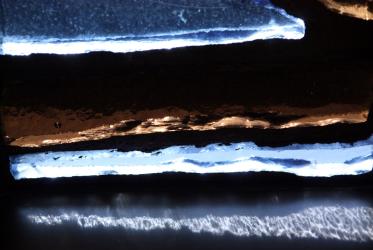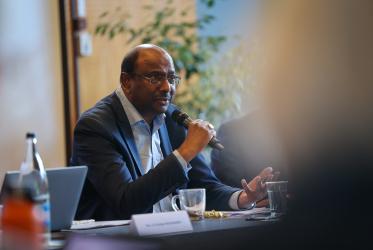At the start of a new year of work at the Ecumenical Centre in Geneva, respected German theologian Jürgen Moltmann led a day-long series of presentations and discussions as a guest of the World Council of Churches (WCC) on Wednesday, 13 January. He also responded to comments and questions on his new book, The Living God and the Fullness of Life (WCC Publications, 2016).
A long-time participant in inter-church affairs on local, regional and international levels, Moltmann insisted that “the ecumenical movement is as much about renewal as it is about unity.” The nearer members of various churches come to Jesus Christ, he said, the nearer they come to each other.
Still, he admitted, “it is common for Catholic theologians to quote Catholic theologians, and for Protestant theologians to quote their like.”
“Although we tend to feel closer to our own tradition than to Christianity as a whole,” he continued, “believers in many parts of the world today are hated and persecuted” not because they are Methodists or Reformed, but “because they are Christians.” Drawing on Saint John Paul II’s papal encyclical on ecumenism, Ut Unum Sint, Moltmann affirmed that the witness of the martyrs is to the One Church of Jesus Christ.
Moltmann warned against placing ultimate confidence in the institutional churches as we see them today. “The vision and hope of the ecumenical movement is not in the church, but in the kingdom of God. We must open ourselves up to the surprises of the future.”
Encouraging the imagination of his listeners, he contrasted the traditionalist churches of the West that arose in the Constantinian era of empire and domination with emerging non-Constantinian churches, especially arising in Asia, Africa and Oceania. These are “minority communities organized as an enterprise,” relying on the support of the Holy Spirit and introducing new forms of spirituality.
“We need a new spirituality of our senses,” said Moltmann, advancing a spirituality that takes the world seriously, moving toward a commitment to “earth religion.” He applauded what he characterized as this “ecological turn to theology.”
“Politically, earth religion creates greater commitment to this life, this earth. It shows appreciation for the body,” he added. “It encourages us to fight against the cult of death.”
Jürgen Moltmann’s visit to the Ecumenical Centre began with a seminar on the pilgrimage of justice and peace, during which the theologian engaged in wide-ranging dialogue and interacted with panelists Dr Clare Amos (inter-religious relations), Rev. Dr Nyambura Njoroge (HIV and AIDS initiatives and advocacy) and Rev. Dr Odair Pedroso Mateus (director, Faith and Order commission). Moltmann then presented the meditation at a noon chapel service and later gave a well-attended public lecture on the future of theology. Each of the day’s events was moderated by WCC general secretary Rev. Dr Olav Fykse Tveit.
As a teenager, Moltmann was drafted into the German auxiliary services and subsequently into the army. He began to study theology as a prisoner of war in 1945-48 before going on to university. He has taught and lectured widely and is professor emeritus of systematic theology at the University of Tübingen.
More information about “The Living God and the Fullness of Life”








